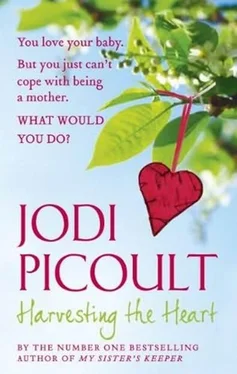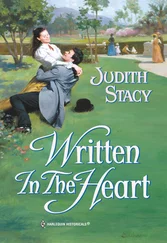Nicholas was impressed. He had seen his mother capture the pain of grieving military widows, the horror of maimed Romanian orphans, even the rapture and calm piety of the Pope. But this time she had done something truly amazing: she had taken Nicholas’s own son and trapped him in time, so that at least here he would never grow up. “You’re so damn good,” he murmured.
Astrid laughed. “That’s what they tell me.”
Something twitched at the back of Nicholas’s mind. He had been just as impressed by Paige, by her haunted drawings and the secrets that spilled out of her like prophecies she couldn’t seem to control. Paige, like his mother, did not just capture an image. Paige drew directly from the heart.
“What is it?” Astrid asked. “You’re a million miles away.”
“It’s nothing,” Nicholas said. What had happened to Paige’s art stuff? He hadn’t been able to move three feet in the apartment without tripping over a spray fixative or crushing a box of charcoal. But Paige hadn’t really drawn in years. He had once complained because she’d hung her sketches over the curtain rod of the shower while the fixative was drying. He remembered watching her from behind, when she didn’t know he was there, marveling as her fingers flew over the smooth vanilla paper to coax images out of hiding.
Astrid held out the other photo she had carried from her darkroom. “Thought you might like this too,” she said. She passed him a candid portrait, and for a moment the dim light in the room caught only the white glare of the damp photographic paper. Then he realized he was staring at Paige.
She was sitting at a table, looking at something off to the left. It was a black-and-white, but Nicholas could clearly see the color of her hair. When he envisioned Cambridge, he pictured it as the shade of Paige’s hair-deep and rich, the red of generations.
“How did you get this?” he whispered. Paige’s hair was shorter here, just to her shoulders, not long as it had been when she’d met Astrid years before. This was a recent photo.
“I saw her once in Boston, and I couldn’t resie hÁ€†st. I took it with a telephoto lens. She never saw me.” Astrid moved closer to Nicholas and touched her finger to the top of the photograph. “Max has her eyes.”
Nicholas did not know why he hadn’t noticed it before; it was so obvious. It wasn’t the shape or the color as much as the demeanor. Like Max, Paige was looking at something Nicholas could not see. Like Max, her expression was one of blameless surprise, as if she had just been told she was going to have to stay for a while longer.
“Yes,” Astrid said, pulling the photo of Max to sit beside the one of Paige. “Definitely his mother’s eyes.”
Nicholas tucked the picture of Paige behind the one of Max. “Let’s hope,” he said, “that’s all he inherits from her.”
Paige
Fly By Night Farm was not really a farm at all. In fact, it was part of a larger complex called Pegasus Stables, and that was the only sign visible from the road. But when I had parked the car and wandered past the lazy stream and the dancing paddocked horses, I noticed the small carved maple plaque: FLY BY NIGHT. LILY RUBENS, PROPRIETOR.
That morning, the woman who owned the tack shop with my mother’s horses running across the ceiling had given me directions. My mother had painted the mural eight years before, when she first moved to Farleyville. She had traded her commission for a used saddle and something called draw reins. Lily was well known on the circuit, according to this woman. In fact, when people came for lesson referrals, she always pointed them toward Fly By Night.
I walked into the cool, dark stable, kicking at a tuft of straw with my feet. When my eyes adjusted to the dim light, I found myself just inches away from a horse, its fermenting breath hot on my ear. I put my hand against the wire mesh gate that separated the horse’s stall from the main aisle of the stable. The horse whinnied, and its jaundiced teeth curved around the chain links, trying to bite at the flesh of my palm. As its lips brushed my skin, they left behind a green slime that smelled faintly of hay.
“I wouldn’t do that if I were you,” a voice said, and I whipped around. “But then again, I am you, and you are me, and that’s the beauty.” A kid no older than eighteen stood propped on a strange skinny rake beside a wheelbarrow piled with manure. He wore a T-shirt colored by a fading portrait of Nietzsche, and his dirty-blond hair was pulled away from his face. “Andy’s a biter,” he said, coming forward to stroke the horse’s nose.
He disappeared as quickly as he’d come, behind the cage door of a different stall. The barn was about half filled with horses, each of them different from the others. There was a chestnut, with hair the same shade as mine; a bay, with a coarse black mane. There was a white Thoroughbred, straight out of a fairy tale; and one tremendous, majestic horse hovering in the shadows, the color of a pitch-dark night.
I walked the length of the aisle, passing the boy, who was heaving wet tufts of hay into the wheelbarrow. It was I f D‡clear that my mother was not in this barn, and I sighed in relief. I turned to a small table at the end of the aisle. It held a wooden chest and-of all things-an Astrid Prescott photo desk calendar, opened to the current date. I ran my fingers over the misty image of Mount Kilimanjaro, wondering why my mother couldn’t have escaped the way Nicholas’s mother had-months at a time, but always with a promise to return. Sighing, I turned to the facing page. Neatly lettered beside the printed hours were female names: Brittany, Jane, Anastasia, Merleen. The handwriting was my mother’s.
I remembered it from before, although when she left I hadn’t been able to read it. I remembered the way her letters all sloped to the left, in spite of the fact that every other written word I’d ever seen leaned a little to the right. After all, that’s what the sisters taught me later in penmanship class. Even when she wrote, my mother bucked the system.
I did not know what I planned to do once I had found her. I did not have a speech ready. On the one hand, I wanted to stare her down and yell at her, one minute for every year since she’d left me. On the other hand, I wanted to touch her, to feel that the substance of her skin was as warm as mine. I wanted to believe I had grown up like her, in spite of the circumstances. I wanted this so badly it hurt, but I knew better than to hedge my bets. After all, I was not sure if, when it came down to it, I would throw myself into her arms or spit at her feet.
I became aware of the blood in my body, which surged down my arms, down my sides. When I remembered well enough how to move again, I pushed through the fear that hung like a net and walked to the boy in the stall. “Excuse me,” I said. “I don’t mean to bother you.”
He did not look up at me or break his rhythmic shoveling. “What are you,” he said, “but a speed bump on the autobahn of life?”
I did not know if he expected an answer, so I took a step into the stall, feeling the damp, soft hay give way under my heel. “I’m looking for Lily Rubens,” I said, trying out her name on my tongue. “I’ve come to see Lily Rubens.”
The boy shrugged. “She’s around,” he said. “Check the ring.”
The ring. The ring. I nodded to the boy’s back and walked down the stable’s aisle again, staring at the telephone tucked against the wall and waiting a moment for magic to happen. What did he mean by the ring?
I slipped out of the dark barn and stepped into such bright sun that for a moment the world was only white. Then I saw the brook, running on this side of the stable as well, and a big metal hangar that reminded me of a roller-skating rink in Skokie that had been turned into a flea market. Right beside the barn I had been in was another barn, and down the bend of a little hill was a third barn, built into the slope of a terraced field. There were two gravel paths, which split to either side of the hangar. One seemed to go across a field where a big horse was bucking, and the other sidelined the little brook. I took a deep breath and set off down that one.
Читать дальше












